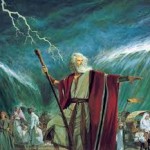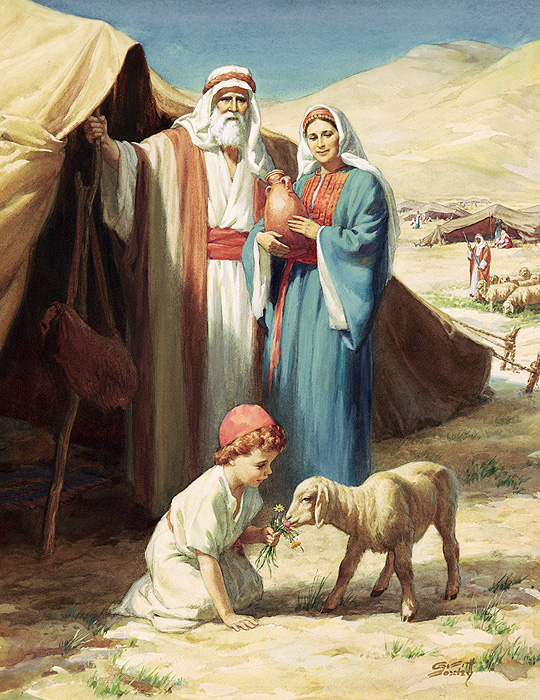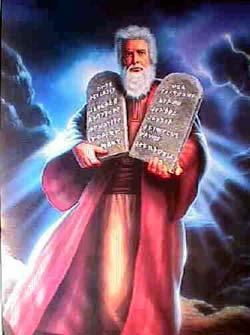GOD SENDS HIS SON
Our study of God’s Story has focused upon Old Testament episodes identifying human sin and God’s desire to help. So now we turn to the New Testament. Thus far the coming Messiah has been anticipated. Jesus, the central figure of God’s Story, stepped out of eternity, and into humanity to reveal God’s redemptive plan. The New Testament does not tell a new story, it reveals God’s conclusion to the story He has been telling since the beginning. “Who is Jesus”? has been asked for 2,000 years. Answers include everything from blatant denials He ever existed, to seeing Him as a great philosopher-humanitarian, to understanding Him as the Son of God. I see Jesus as the infallible inerrant Son of God, who lived a perfect life, died a sacrificial atoning death, and was raised to life again. I trusted Jesus as my Savior in late October 1959. Think about the date you trusted Jesus as your Savior.
Read John 1:1-2, 14 The Son’s Identity
Sometime around AD 90, the apostle John set out to answer the question, “Who is Jesus?”. The result was the Gospel of John. John knew Jesus was the pinnacle person of God’s Story. The Bible begins with the words, “In the beginning” (Gen. 1:1). John chose to begin his story of Jesus the same way, with the words “In the beginning”. He did this as an acknowledgment that Jesus deserved the same reverence and recognition normally reserved for God. More importantly, John wanted to establish from the first that Jesus was not an afterthought or a plan B in God’s Story. Rather, Jesus was actively involved as the key character of God’s Story from the “the beginning”. In fact, John’s beginning goes beyond the beginning of creation recorded in Genesis 1:1. John began his Gospel with an emphasis on the Word, “ho logos”. In this context, ”word” described what was spoken, done, or existed. With the words “in the beginning was the Word”, John declared that Jesus existed before creation. Though he did not call Jesus by name until John 1:17, John declared Jesus to be pre-existent, divine Word.
The “word” was term used by theologians and philosophers, both Jewish and Greeks, in many different ways. In Hebrew Scriptures, the “word” was an agent of creation (Ps. 33:16, the source of God’s message to His people through the prophets (Hosea 4:1), and God’s law, His standard of holiness (Ps. 119:11). In Greek philosophy, the “word” was the principle of reason that governed the world, or the thought still in the mind. While in Hebrew thought, the “word” was another expression for God. John’s description shows clearly that he is speaking of Jesus (1:14)- a human being he knew and loved, but at the same time the Creator of the universe, the ultimate revelation of God, the living picture of God’s holiness, the one who “holds all creation together” (Col. 1:7). To John, the new understanding of the “word” was the Good News of Jesus Christ. As one of Jesus’ 12 disciples, John writes with credibility and the details of an eyewitness. John’s book is not a biography (like the book of Luke); it is a thematic presentation of Jesus’ life.
Many in John’s original audience had a Greek background. Greek culture encouraged worship of many mythological gods, whose supernatural characteristics were as important to Greeks as genealogies were to Jews. John shows that Jesus is not only different from but superior to these gods of mythology. What Jesus taught and what He did are tied inseparably to who He is. John shows Jesus as fully human and fully God. To say the “word” “ was with God” indicated a separate Person who was with God the Father in eternity past. To say the “word” “ was God” indicated Jesus was not a separate God, but rather a separated Person within the Godhead. The “word” also “took up residence among us”. “Among us” echoes Isaiah’s prophecy of Immanuel, “God is with us” (Isa. 7:14). Because the “Word took up residence among us”, “We observed His glory”. Jesus is God’s only and unique Son. Before Christ came, people could know God partially. After Christ came, people could know God fully because He became visible and tangible in Christ. Christ is the perfect expression of God in human form.
Read John 1:11-13, 18, 29 The Son’s Purpose
What’s the sad news of verse 11? (Jesus’ own people did not receive Him.) What’s the great news of verse 12? (For those who did receive Jesus He gave them the right to be children of God.) Having identified the Son, John sought to spell out His purpose. First, Jesus purposed to reach His own people. John recounted how Jesus “came to His own”. Understandably, Jesus went first to the Jewish people in order to get them back on track with God’s plan. Unfortunately, many of “His own people did not receive Him”. Second, Jesus purposed to redeem all who would receive Him, Jew or Gentile. John quickly focused on those “who did receive Him”. They received Him by taking hold of His message and accepting His words as truth. Those who “did receive Him” were those who “believe in His name”. To believe “in His name” means to buy into every aspect of His character and purpose.
Third, Jesus purposed to manifest the will of God. Those who believe in Jesus’ name “were born” of God. John likened becoming a child of God to being born in a spiritual sense. In America, the phrase “born again”, derived from John 3:3, became popular and political when presidential candidate Jimmy Carter used the phrase. Fourth, Jesus purposed to reveal God. Jesus became flesh, people can understand God through His ministry. For the second time, John referred to Jesus as “the One and Only Son”, rendering “monogenes”. The term speaks to Jesus’ unique relationship with the Father, making Him uniquely qualified. Because Jesus came to earth from “the Father’s side”, He revealed God to people.
Finally, Jesus purposed to take away the world’s sin. John the Baptist identified Jesus as “the Lamb of God”, a title used only twice (John 1:29, 36). John the Baptist called people’s attention to Jesus, “Here is the Lamb of God”. For the Hebrews, the “lamb” was the sacrificial animal of the Passover. According to the law, without the shedding of blood there was no forgiveness of sin (Heb. 9:22). Thus, “the Lamb of God, who takes away the sin of the world” was God’s ultimate sin-sacrifice to remove our sins once and for all. No human being has ever actually seen God. But the Word who had an intimated relationship with Him has declared Him to humans. In verse 18, Jesus, the seen, explained precisely and clearly the unseen God, the Father. A new creative and redemptive act was begun through the Word who became a person. In Christ, God became a man who lived on earth – and in Revelation, John tells us God will again live on this new earth.
Read Matthew 4:17-24 The Son’s Ministry
How did the lives of Peter, Andrew, James, and John change when they encountered Jesus? (They left their nets and “immediately” left their current life and followed Jesus.) What is the message to us in the actions of these disciples? (To follow Jesus unconditionally!) Jesus ministry consisted of three primary activities: preaching, teaching, and healing. An important aspect of His preaching was an emphasis on repentance (Matt. 4:17). Preach renders the Greek “kerusso”, meaning “to be a herald” of a message with an implication of formality and authority (Paul tells us this also). God’s desire was to change lifestyles by having the people repent and establishing one’s relationship to God. Matthew preferred to refer to the kingdom of God as the “kingdom of heaven” and he stated it had come near- if you repent and put it in your heart. Matthew used Jesus’ words over and over again to emphasis the importance of having a “right heart”. Jesus started His ministry with the same message people had heard John the Baptist say “Repent of your sins”. The message is the same today as when Jesus and John gave it. Becoming a follower of Christ means turning away from our self-centeredness and “self” control and turning our life over to Christ’s direction and control.
Jesus used the ministries of teaching, preaching, and healing in order to point people to God (vv. 23-24). Jesus’ preaching took the form of open-air proclamation, often times impromptu as the occasion arose. As for healing, Jesus touched people therapeutically. Jesus’ teaching took place in synagogues He visited. Because of Jesus insightful teaching, authoritative preaching, and effectual healing of many, “the news about Him spread throughout Syria”. In New Testament times, Syria referred to the Roman providence and region just north of Galilee. Here, His reputation grew fast and people came to Him- and “He healed them”. Jesus was not their best hope for healing. He was their only hope!!! Jesus is our only hope and the only way to salvation. In God’s Story, Jesus is all we need.





